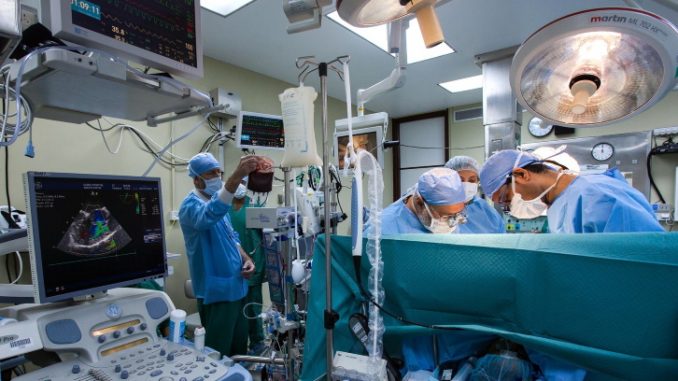
The NHS trust which runs the Friarage and James Cook hospitals says it is still on track to cut the number of patients waiting for more than two years for non-urgent planned medical procedures to zero by the end of next month.
Members of the board of governors at the South Tees Hospitals NHS Foundation Trust were told that 70 patients were in this category in the last week of January.
This was a decrease from a hundred in December.
Samuel Peate, the trust’s chief operating officer, said: “We have a clear operational plan to ensure that we have no patients waiting beyond two years at the end of March.”
He said the trust, which operates the James Cook University Hospital in Middlesbrough and Northallerton’s the Friarage Hospital, had less than 1,600 patients waiting more than 12 months for treatment at the turn of the year, in line with its internal planning.
This was down from a peak of more than 4,000 in the spring of last year.
All hospital trusts have put in place recovery plans to bring down a huge backlog in waiting lists, exacerbated by the covid-19 pandemic.
Mr Peate said January was the most challenging month of the year for the trust and said patient complaints were above the target the organisation had set itself for the first time in 10 months.
Trust chief executive Sue Page said that despite disruption caused by an increase in covid-19 infections in local communities, surgical teams had delivered more than 2,800 operations during December and the first week of January, of which 2,000 were planned surgical procedures.
Over the same period almost 56,000 outpatient appointments took place.
Thirty two non-urgent medical operations were, however, cancelled in December, including seven on the day.
Mr Peate said cancer continued to be “an area of focus”.
Only 67% of patients with suspected cancer symptoms were seen by the trust within 62 days in December, compared to a national 85% target.
An integrated performance report for December said indicators of safety and effectiveness suggested that staffing and demand pressures had not translated into a reduction in the quality of patient care being delivered.
Sickness absence ran at 5.76% in December among staff with covid-19 absences “rising sharply” towards the end of month due to the omicron variant.
A separate safe staffing report said colleagues were supporting each other across different wards and services and twice-daily clinical staffing meetings were taking place throughout the winter to ensure safe staffing at all times.
The report said: “Everyone has worked hard to make sure patients – including those whose care has been disrupted by the pandemic – have continued to receive the care they need.”
The NHS trust which runs the Friarage and James Cook hospitals says it is still on track to cut the number of patients waiting for more than two years for non-urgent planned medical procedures to zero by the end of next month.
Members of the board of governors at the South Tees Hospitals NHS Foundation Trust were told that 70 patients were in this category in the last week of January.
This was a decrease from a hundred in December.
Samuel Peate, the trust’s chief operating officer, said: “We have a clear operational plan to ensure that we have no patients waiting beyond two years at the end of March.”
He said the trust, which operates the James Cook University Hospital in Middlesbrough and Northallerton’s the Friarage Hospital, had less than 1,600 patients waiting more than 12 months for treatment at the turn of the year, in line with its internal planning.
This was down from a peak of more than 4,000 in the spring of last year.
All hospital trusts have put in place recovery plans to bring down a huge backlog in waiting lists, exacerbated by the covid-19 pandemic.
Mr Peate said January was the most challenging month of the year for the trust and said patient complaints were above the target the organisation had set itself for the first time in 10 months.
Trust chief executive Sue Page said that despite disruption caused by an increase in covid-19 infections in local communities, surgical teams had delivered more than 2,800 operations during December and the first week of January, of which 2,000 were planned surgical procedures.
Over the same period almost 56,000 outpatient appointments took place.
Thirty two non-urgent medical operations were, however, cancelled in December, including seven on the day.
Mr Peate said cancer continued to be “an area of focus”.
Only 67% of patients with suspected cancer symptoms were seen by the trust within 62 days in December, compared to a national 85% target.
An integrated performance report for December said indicators of safety and effectiveness suggested that staffing and demand pressures had not translated into a reduction in the quality of patient care being delivered.
Sickness absence ran at 5.76% in December among staff with covid-19 absences “rising sharply” towards the end of month due to the omicron variant.
A separate safe staffing report said colleagues were supporting each other across different wards and services and twice-daily clinical staffing meetings were taking place throughout the winter to ensure safe staffing at all times.
The report said: “Everyone has worked hard to make sure patients – including those whose care has been disrupted by the pandemic – have continued to receive the care they need.”
Dr Hilary Lloyd, the South Tees trust’s chief nurse, told governing body members staff were “tired and they need time to rest and recuperate”.


Be the first to comment